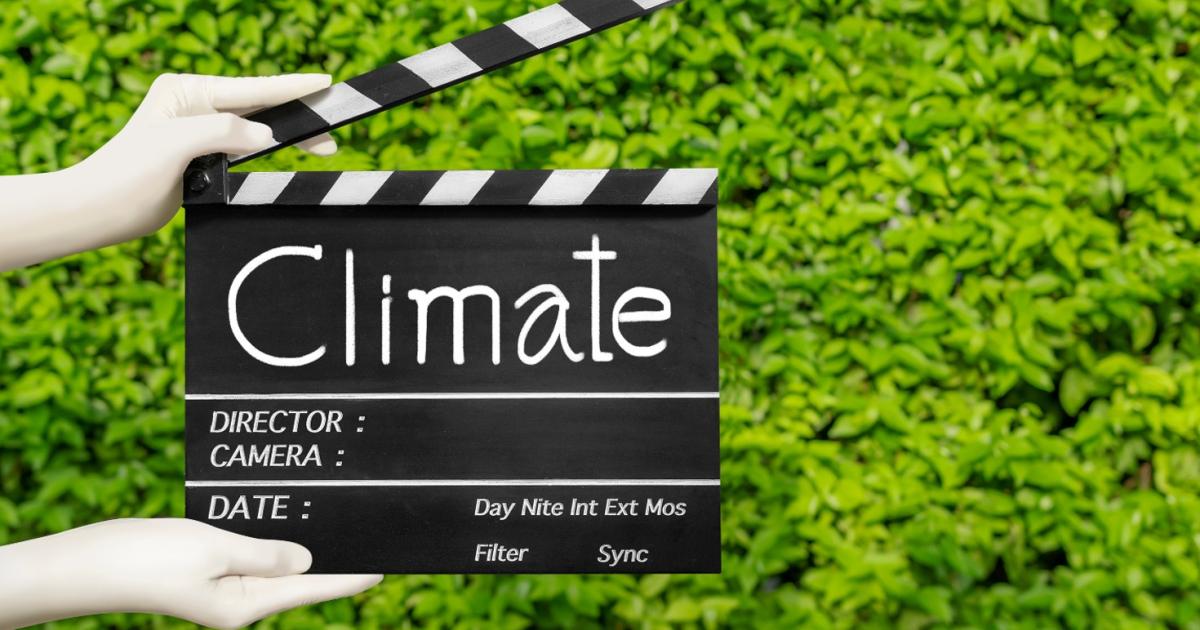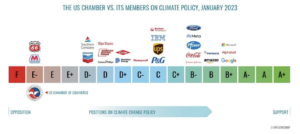
Communicating the climate crisis effectively is one of the most complex — and consequential — challenges of our time. While humans already have many solutions needed to limit global warming to 1.5 degrees Celsius above pre-industrial averages, we lack the ability to inform, inspire and persuade a critical mass to act decisively and immediately.
To keep warming at this threshold, "deep, rapid and sustained greenhouse gas emissions reductions will be needed in all sectors this decade," according to the Intergovernmental Panel on Climate Change (IPCC). Success means pursuing a policy of "climate resilient development" — which involves integrating measures to adapt to the climate crisis with actions to reduce or avoid greenhouse gas emissions in ways that provide wider benefits, the IPCC says.
Plenty is already being done to develop these "measures" — yet our collective success hinges on the ability to get businesses, governments and everyday people to give a damn and do something.
Outside of the climate action echo chamber, few folks see global warming as a crisis in need of immediate action. Despite the increased frequency and intensity of extreme droughts, hurricanes, tornados, wildfires and other climate disasters, most folks still rank the climate crisis as a low-priority issue.
Before we can better communicate on climate, we first must understand the underlying challenges. Let’s take a look at a few — so we can do better.
Stories create order in a chaotic world
While in recent years many climate communicators hoped that data could turn the tide — the more proof points and scientific facts we could muster, the more people would act on the climate crisis — this has turned out not to be the case.
Humans already exist in a state of information overload with too much going on, all the time, for us to process the high volume of data that pervades our waking hours. We turn to stories as a heuristic — or mental shortcut — to make sense of a chaotic existence. This was as true thousands of years ago as it is today.
Facts and numbers don’t inspire people. Stories do.
"Homo sapiens is a storytelling animal that thinks in stories rather than in numbers or graphs, and believes that the universe itself works like a story, replete with heroes and villains, conflicts and resolutions, climaxes and happy endings," writes Yuval Noah Harari in "21 Lessons for the 21st Century."
There are multiple villains and heroes — and almost all of us play both roles from time to time.
The problem is, condensing the complexities of the climate crisis into a simple narrative is nigh impossible. That’s because there are multiple villains and heroes — and almost all of us play both roles from time to time. And even if we succeed with near-term climate goals, there won't be a satisfying "ending" to this story. Living within nature’s boundaries will be something humans must grapple with indefinitely.
To improve climate communication, we must avoid the hero-villain framing altogether. As George Marshall writes in his must-read book about climate change communication, "Don’t Even Think About It": "... the real battle for mass action will not be won through enemy narratives… we need to find narratives based on cooperation, mutual interest and our common humanity."
Likewise, we need to break down the broader story of the climate crisis into smaller supporting narratives that are time-based and capable of resolution.
Meaning at the expense of truth
Stories don’t have to be true for people to accept them. Folks cling to fantastical stories that defy the facts all the time. That’s because humans care more about meaning than truth.
"The storytelling mind is allergic to uncertainty, randomness and coincidence," writes Jonathan Gottschall in "The Storytelling Animal." "It is addicted to meaning. If the storytelling mind cannot find meaningful patterns in the world, it will try to impose them."
We see this time and again with people who downplay or deny the climate crisis — and most recently with the rabble causing the anti-ESG distraction. For the anti-ESG folks, the manufactured narrative that "woke liberals are undermining capitalism" is so potent that they fail to see the truth: ESG is simply about investing with an eye for clear and systematic ESG risk and opportunity in hopes of creating long-term value.
Framing the climate crisis as a dual economic threat and opportunity might resonate more.
When communicating climate, we must grapple with stakeholders’ confirmation bias, the tendency to cherry-pick information that confirms existing beliefs or ideas. This is why two people with opposing views on the climate crisis can look at the same facts and come away feeling validated about it.
While there’s no simple way to overcome confirmation bias, throwing more facts and data at someone won’t sway them. Rather, engaging these folks with curiosity and a willingness to listen can disarm them and open the door to productive conversations.
Climate doom is as unhelpful as denial and downplay
One of the biggest challenges when communicating the climate crisis is striking the right balance of hope and despair — creating a kind of "constructive worry," as the Washington Post’s Shannon Osaka calls it.
While it’s true that the worst-case climate scenario is incredibly dire — famine, extreme weather, conflict and infectious diseases marked by mass death and even eventual extinction — stories that foster climate doom are as unhelpful as climate denial. In between the climate doomers and deniers are what I call the "climate downplayers" — folks who accept the climate crisis as real yet don’t assign it the appropriate level of importance. That’s basically all of us.
We need people to understand the severity of the situation while giving them the agency to do something about it. A place to start is finding ways to make the climate crisis more salient. The greatest salience belongs to threats that are concrete, immediate and irrefutable. People need to pay their bills, for example, so the economy is a highly salient issue that almost always ranks at the top of people’s priority list. Framing the climate crisis as a dual economic threat and opportunity might resonate more with people than focusing on doomsday alone.
The climate crisis may prove to be one of the greatest stories ever told — and it’s up to us to decide what happens next.
- SEO Powered Content & PR Distribution. Get Amplified Today.
- Platoblockchain. Web3 Metaverse Intelligence. Knowledge Amplified. Access Here.
- Minting the Future w Adryenn Ashley. Access Here.
- Source: https://www.greenbiz.com/article/why-communicating-climate-so-hard
- :has
- :is
- :not
- $UP
- 1
- 8
- a
- ability
- About
- about IT
- above
- Accept
- According
- Act
- Action
- actions
- adapt
- agency
- All
- allergic
- alone
- already
- always
- an
- and
- animal
- appropriate
- ARE
- article
- AS
- At
- Balance
- based
- Basically
- Battle
- BE
- because
- being
- believes
- benefits
- Better
- between
- bias
- Biggest
- Bills
- book
- both
- boundaries
- Break
- broader
- businesses
- by
- call
- CAN
- cannot
- capable
- capitalism
- care
- case
- causing
- Celsius
- challenges
- Chamber
- change
- clear
- Climate
- climate action
- Climate change
- climate crisis
- coincidence
- Collective
- come
- Common
- communicate
- communicating
- Communication
- complex
- complexities
- confirmation
- conflict
- constructive
- conversations
- cooperation
- could
- create
- Creating
- crisis
- critical
- curiosity
- data
- Death
- decade
- decide
- deep
- Despite
- develop
- Development
- dire
- disasters
- diseases
- do
- Dont
- doom
- doomsday
- Door
- down
- echo
- Economic
- economy
- effectively
- Emissions
- engaging
- ESG
- Ether (ETH)
- Even
- eventual
- EVER
- everyday
- example
- existing
- expressed
- extinction
- extreme
- eye
- FAIL
- few
- Find
- finding
- First
- focusing
- For
- Foster
- Frequency
- from
- GAS
- George
- get
- Give
- Giving
- Global
- global warming
- Goals
- going
- Governments
- graphs
- greatest
- greenhouse gas
- Greenhouse gas emissions
- happens
- happy
- Hard
- Have
- Heroes
- High
- highly
- hope
- hopes
- HOURS
- HTTPS
- Humanity
- Humans
- i
- ideas
- immediate
- immediately
- importance
- impose
- impossible
- improve
- in
- increased
- incredibly
- Infectious diseases
- inform
- information
- inspire
- Integrating
- interest
- into
- investing
- issue
- IT
- itself
- jpg
- Keep
- Kind
- Lack
- Lessons
- Level
- like
- LIMIT
- List
- living
- long-term
- Look
- make
- manufactured
- many
- marked
- Mass
- May..
- meaning
- meaningful
- means
- measures
- mental
- might
- mind
- more
- most
- multiple
- mutual
- NARRATIVE
- narratives
- necessarily
- Need
- needed
- next
- Noah
- node
- numbers
- of
- on
- ONE
- open
- Opportunity
- or
- order
- Other
- our
- Overcome
- panel
- patterns
- Pay
- People
- people’s
- perspectives
- pervades
- Place
- plato
- Plato Data Intelligence
- PlatoData
- Play
- points
- policy
- position
- priority
- Problem
- process
- productive
- proof
- Prove
- provide
- Publishes
- randomness
- range
- ranks
- rapid
- rather
- real
- recent
- recently
- reduce
- reflect
- resilient
- Resolution
- Resonate
- Risk
- roles
- same
- says
- scenario
- Sectors
- sense
- Simple
- simply
- situation
- smaller
- So
- Solutions
- Someone
- something
- start
- State
- Still
- Stories
- Story
- storytelling
- succeed
- success
- Supporting
- Take
- than
- that
- The
- the world
- their
- Them
- There.
- These
- they
- Thinks
- this
- thousands
- threat
- threats
- threshold
- Through
- Throwing
- Tide
- time
- to
- today
- too
- top
- transition
- true
- truth
- TURN
- Turned
- UN
- Uncertainty
- underlying
- understand
- Universe
- us
- validated
- value
- views
- Villains
- volume
- was
- washington
- Way..
- ways
- we
- Weather
- What
- which
- while
- WHO
- why
- wider
- will
- Willingness
- with
- within
- Won
- works
- world
- would
- years
- zephyrnet








